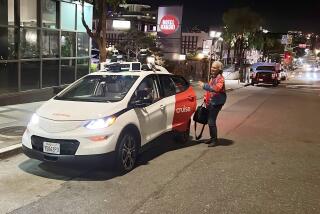Finding an Island of Safety at Sea
COZUMEL, Mexico — There were no gala bon voyage parties: Visitors not allowed. No tossing of confetti as passengers waved farewell to loved ones: No spectators permitted past the terminal checkpoint. After posing for the usual pre-boarding portrait by a ship photographer, passengers posed again at the top of the gangplank, this time for a mug shot electronically linked to a blue ID card.
Some things were different on a recent cruise of the western Caribbean aboard the Grand Princess, but maybe not all that different. Although some cruise lines have reported a falloff in business since the Sept. 11 terrorist attacks (and two have filed for Chapter 11 bankruptcy protection), the Grand Princess hardly noticed the bump.
The ship, one of the largest on the seas, left Oct. 21 from Fort Lauderdale, Fla., with 2,652 passengers. (The ship holds 3,000 if every bunk bed, baby crib and folding cot is booked.)
Signs atop the purser’s desk in the opulent lobby atrium told those who wanted to switch staterooms for a better one, “Grand Princess is fully booked this sailing. There are no alternative cabins available.”
That’s been the situation for most of the past few sailings on this ship, one of 10 in the Princess fleet, said assistant purser Deryck Greer. “There was a drop-off the week after the incidents, but since then, it’s been like this,” he said. “People book so far ahead of time, I suppose they figure, ‘Might as well go ahead with it.”’
On embarkation day in the immense Princess terminal at Port Everglades, passengers left their luggage, as usual, with porters at curbside who placed the bags in steel cages for transfer to the ship by forklift.
Passengers got their ID cards and, after a longer-than-usual process at the X-ray machine and metal detector, finally made their way up the gangplank. Then each inserted the card and posed for the mug shot. Princess had been insisting on the photo ID for a few years, but on some other lines this extra security precaution has just been introduced.
Princess line regulars, thinking they might step outside the bare-bones terminal to find an ATM or a cup of coffee after completing the paper work, saw “No Reentry” posted above the doors and security personnel, arms folded, ready to enforce the rule. Once inside the terminal, people could board the ship or go home.
Behind the registration desk, more security staff with holstered pistols examined the occasional document that didn’t seem quite in order. Once settled in and strolling the decks, cruisers might have noticed the Coast Guard launch Bluefin bobbing near the pier.
The Coast Guard sailed in tight circles on Grand Princess’ port side, occasionally moving forward to accompany other departing cruise ships as they began to make their way through the narrow Port Everglades channel toward the open sea. A smaller patrol boat, blue light flashing, kept pace with the mammoth ships the rest of the way to the port’s mouth.
Because of some luggage delays, Grand Princess missed its 5 p.m. departure by nearly an hour. It stood by while the Celebrity Millennium and Royal Caribbean’s Enchantment of the Sea exited.
At the aft swimming pool, five female Princess crew members in dark blue polo shirts and white shorts got a party spirit going by lip-synching “YMCA,” then performing a bar-top “Macarena.”
Passengers sang along, drank their cocktails and never seemed to notice the helicopter that circled the port. Another Princess crew member leaned on a rail outside his post somewhere in the Princess’ mechanical guts. He nodded toward the Coast Guard vessel and said, “That’s new, since the events. Just to keep an eye on things.”
Finally, Grand Princess pulled away from the pier, following Holland America’s Zaandam. Passengers jammed the rails. The ship horns let out mighty blasts. Fort Lauderdale residents waved farewell from the balconies of their beachfront condominiums. A young man elbowed his way to the portside Lido Deck rail and unfurled an American flag. Without the parties and confetti, that send-off would have to do.
A scattering of passengers chose stars and stripes as part of their cruise ensemble. The flag motif showed up on hats, T-shirts, pins, ribbons, beach towels and even one little girl’s rubber flip-flops.
The message seemed to be: We’re cruising because we want to, and no enemy of America can stop us.
“We were determined to go. We did it almost as an act of defiance,” said Leslie Tuten of suburban Atlanta. She and her husband had booked the cruise before Sept. 11. They said they never considered canceling.
Grand Princess stopped first at Princess Cays, the cruise line’s private beachfront property in the Bahamas. Passengers seemed to be enjoying a carefree day frolicking with water toys, snorkels and volleyballs or sunning on the hundreds of beachside lounge chairs.
In a couple of pavilions, crew members laid out a barbecue luncheon. It was like a company picnic, if the company happens to have access to endless clear water, blue sky and acres of mangrove and sea grape.
Greg and Alicia Earlywine set their heaping plates down on one of the picnic tables. Somebody at the table asked them whether this was their first cruise. “It is,” Greg said. “And it won’t be our last. We’re having a great time.”
It was Monday. Greg and Alicia were married the previous Saturday in Lexington, Ky., their hometown. They couldn’t recall whether the cruise had been booked before or after Sept. 11, but they said that made no difference. They flew from Cincinnati to Fort Lauderdale the day after their wedding. “I was a little scared getting on the plane,” Greg said. “I was watching everybody. As soon as we got on the ship, I felt fine, very secure.”
At the next port, Grand Cayman Island, nearly every store window bore an American flag, including the shops selling Cuban cigars. At breakfast that morning, a man at one crowded table noted that Grand Cayman has a town called Hell. “I gotta go there and get one of those T-shirts that says, ‘Been to Hell and Back.”’
A woman in the group said, “I think I’ve been there before.” Another man chimed in, “Twice.”
Besides Hell, Grand Cayman has many other attractions: Seven Mile Beach, a farm where green sea turtles are raised and an area where it’s possible to swim with gentle manta rays. A local tour guide greeted the tender hauling people ashore and offered taxi rides to any or all of those attractions. “Don’t be scared, guys,” he yelled. “This is the safest island in the Caribbean.”
Still, the lively shopping district drew the largest crowds, and scores of visitors from the Grand Princess and Carnival Triumph wandered between Diamonds Direct, the Tanzanite Market, Tortuga Duty-Free Liquors and the rest. Everywhere, they would encounter those American flags taped to windows and jitney windshields.
A few shoppers took the time to read tiny print below the last white stripe. It said the flags were distributed by A.L. Thompson’s Home Depot, Appliance Center and Roof Truss Plant. “To express your support to the country that supplies us with our food, clothing, building materials and other goods, and to the many United States citizens who live among us, please hang this flag in the window.”
When the time came to reboard the tenders, passengers were stopped at a table where Grand Princess staffers in white uniforms and caps and orange vests that identified them as security personnel pawed through shopping bags and beach towel baskets.
One officer passed a metal-detector wand over my backpack. I asked him whether this was a new practice or whether Grand Princess always held these inspections. “Since Sept. 11, we always do this,” he snapped.
Back on board, Laura Stawiary of Orlando, Fla., remarked, “I bet they just do that so nobody sneaks any duty-free liquor on the ship.” Early on, an announcement had told passengers that all liquor brought to the ship would be held for safekeeping until the last day of the voyage. The same held true for duty-free booze ordered in one of the Grand Princess boutiques.
One customer in the ship’s store asked a clerk whether there was some way to get around the U.S. Customs rule that allows only one duty-free liter of spirits per person. “They probably won’t even stop you,” the clerk said. “With all that’s going on right now, they’re more concerned about security than anything else.”
So were the Grand Princess people. The bag inspections continued at the last two ports, Majahual on Mexico’s Costa Maya and the island of Cozumel.
No one objected strongly to the inconvenience. Steve Dineley of suburban Toronto told his dinner companions one night in the Michelangelo Dining Room, “I know it sounds trite, but this is the time people should go ahead and travel.” Chris, his spouse, added, “This is probably the safest time to go somewhere.”
After a few days aboard the Grand Princess, it was difficult to relate to what sort of times people meant. It was a time to lounge around swimming pools and read John Grisham novels, or trot on gymnasium treadmills while overhead TV sets offered the latest from CNN and its coverage of “Strike Against Terror.”
Meanwhile the public address system blasted Harry Belafonte singing “Day-O.” A string quartet performed in the atrium during quiet afternoons at sea. A comedian held forth for an hour in the Vista Lounge, avoiding topical jokes.
A recording of “Celebration” (“Celebrate good times, come on!”) swept across the pool decks again and again. Marv Marcus of Salt Lake City didn’t want anyone to get him wrong, but he was an Air Force navigator in Vietnam and knows horror is horror whether it happens in New York, in Washington or across the Pacific. He was about to collect a Carnival cruise he had won for being the top salesman in the printing firm where he works.
Then it happened, and the cruise was canceled. He and his wife, Sheree, decided to cruise anyway, on their own dime. They had fantasized about the upcoming trip; it would have been their first cruise, and they would not be denied.
“Look, people will have to stop eating if we all don’t keep on doing what we’re doing,” he said. “We had the opportunity to take a cruise, and we took it. I’m 58. Nobody gives you tomorrow. I learned that in Vietnam. Life in this United States changed since Sept. 11. We may not have the opportunity to do this in a couple of years. We may all become isolationists to protect ourselves.”
His wasn’t the only gloomy note, but it may have been the most profound.
After a couple of days, people began feeling so comfortable with their vacation choice that they could gripe about certain things on the menu (“What was that ?”), or late-arriving laundry, or a missing bathroom light bulb.
A few couples bickered, just like the old days. A man and woman walked toward the last security check of the cruise at the Cozumel port. The man was pouting. But the woman put it in perspective: “Hey, when you think about what’s been happening to other people, I’d say we’re pretty ... lucky.”
*
Robert Cross is a travel writer for the Chicago Tribune. His e-mail is Bcross@tribune.com.
More to Read
Sign up for The Wild
We’ll help you find the best places to hike, bike and run, as well as the perfect silent spots for meditation and yoga.
You may occasionally receive promotional content from the Los Angeles Times.






